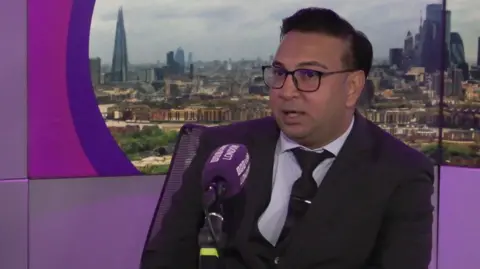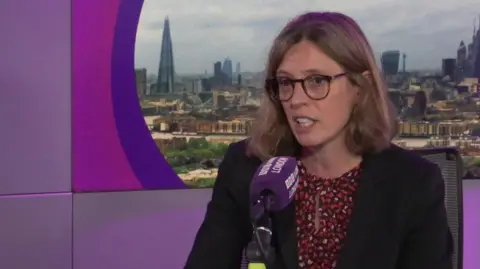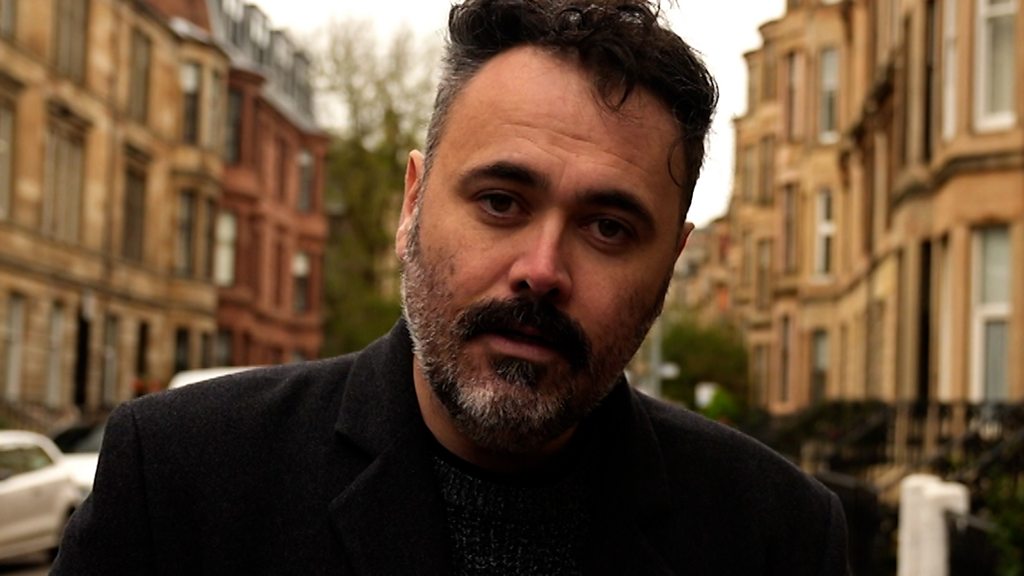
 BBC
BBC
Varun lost his entire life savings after he was a victim of romance fraud on a dating app
Romance fraud, a growing crime that targets both the heart and the pocket - saw an estimated £106m lost by UK victims in the past financial year.
One of those who lost money and a romance was Varun Yadav, a London banker who hoped to find a life partner on a dating app.
Now £40,000 poorer after being persuaded to invest in crypto trading, he said he saw the warning signs - but he was so emotionally attached he ignored his suspicions. And when he realised what happened, fear and shame kept him quiet.
Action Fraud - the national body for reporting such scams - said it can have a serious impact on victims, "not just financially but emotionally, socially and even physically".
Mr Yadav thought he had met his ideal woman on a site called Jeevansathi, meaning "life partner" in Hindi.
She said her name was Rekha Shah.
After months of chatting over WhatsApp and video calls, she asked him if he would invest with her.
Mr Yadav lost his life savings and left him feeling suicidal.
"You see all the signs, but you are so emotionally attached. You are willing to lose the money, but you are not willing to lose the connection," he told BBC Radio London.
The Financial Conduct Authority (FCA) said banks were missing opportunities to help break the spell of romance scams.
Better detection and monitoring systems, identifying vulnerability early on, and compassionate aftercare would all improve outcomes for victims.
Firms needed to train staff to spot red flags and critically probe customer explanations, it said.

 PA Media
PA Media
Romance fraud involves fraudsters exploiting victims for money by gaining their trust and affection through the guise of a romantic relationship
Mr Yadav's initial caution about a cryptocurrency platform called Deuncoin was assuaged by the fact he could withdraw money.
Then he made a big loss, and "Rekha Shah" asked him to put in all his savings to recover the losses. Once done, he was suddenly unable to withdraw the funds, and he realised "it was all one big scam".
"I thought, I've lost everything. I've lost the person I thought was going to be my life partner, I've lost all my life savings."

![Getty Images A text message being sent on a phone, reading 'I love [heart emoji] you. can you send me some money [heart emoji]'.](https://ichef.bbci.co.uk/news/480/cpsprodpb/8c60/live/691d6cf0-aa7f-11f0-aa13-0b0479f6f42a.png.webp) Getty Images
Getty Images
Romance fraud involves fraudsters using a romantic relationship to exploit their victims for money by gaining their trust and affection
Mr Yadav said he hoped sharing his story would help ensure others do not have to face what he went through alone.
"When I shared my story with my friends, a lot of them said they'd been part of a similar scam, but were too ashamed to say it.
"This is a trauma that will stay with me for life, but I've learnt coping mechanisms and rebuilt my life. There is hope."
What is romance fraud?
Romance fraud involves fraudsters creating fake online personas to gain someone's trust and affection through the guise of a romantic relationship, and ultimately exploiting them for money.
They manipulate, persuade and exploit victims, often encouraging them to isolate themselves socially and requiring urgency and secrecy from the victim.
Action Fraud's key tips for protecting yourself against romance fraud include:
Never send money, vouchers or cryptocurrency to someone you've met onlineTreat people as you would if meeting in person, by asking questions and taking your timeBe cautious about how much information you share, and keep your social media accounts private and secureTalk to friends and familyIf you think you have been a victim of romance fraud, contact your bank immediately and report to Action Fraud

DSupt Kerry Wood, head of economic crime for the Met Police, said "awareness is the most powerful defence against fraud"
Earlier this month, the Metropolitan Police launched a campaign to help prevent people like Mr Yadav from getting scammed.
This included videos giving real-life accounts from victims, showing what romance fraud looked like, how to prevent it, and where to get further support if needed.
They have also undertaken intelligence sharing to trace suspects overseas, and collaborated with banks, dating apps and social media sites to identify fraud.
Det Supt Kerry Wood, head of economic crime for the Met Police, said romance fraud was "one of the most devastating".
"It's an abuse of trust which has a devastating impact on people's confidence and sense of self-worth.
"Awareness is the most powerful defence against fraud. By talking openly, we can protect ourselves, our loved ones, and our communities from this deeply personal and damaging crime and bring those responsible to justice."
Mr Yadav was not able to recover the money he lost, but said he had "made his peace with it" and has rebuilt his life since.
He is now encouraging anyone going through romance fraud to reach out to family, friends and colleagues and most importantly "do not isolate yourself".

 Movie
Movie 1 month ago
90
1 month ago
90 





![Presidents Day Weekend Car Sales [2021 Edition] Presidents Day Weekend Car Sales [2021 Edition]](https://www.findthebestcarprice.com/wp-content/uploads/Presidents-Day-Weekend-car-sales.jpg)




 English (United States)
English (United States)